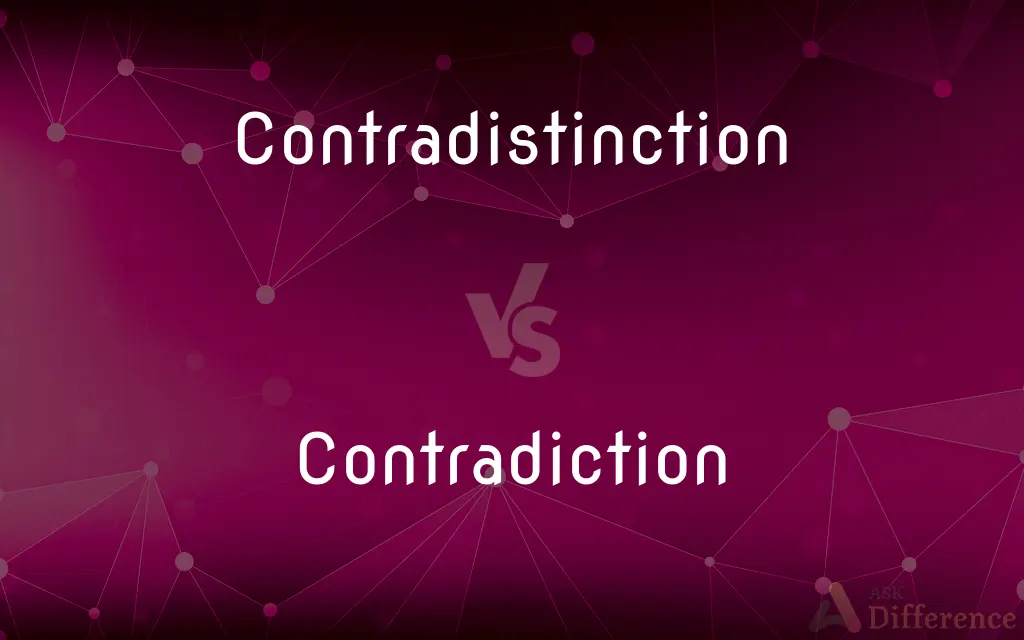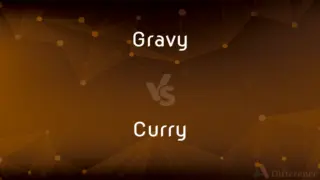Contradistinction vs. Contradiction — What's the Difference?
Edited by Tayyaba Rehman — By Fiza Rafique — Updated on April 1, 2024
Contradistinction emphasizes differentiation by comparison, whereas contradiction involves direct opposition in statements or ideas.

Difference Between Contradistinction and Contradiction
Table of Contents
ADVERTISEMENT
Key Differences
Contradistinction is a method of highlighting differences between two things by direct comparison, focusing on the unique aspects that set them apart. Whereas, contradiction refers to a situation or assertion in which two or more statements, ideas, or actions are opposed to one another, suggesting that if one is true, the other must be false.
In the realm of logic and argumentation, contradistinction is used to draw clear boundaries between concepts or categories, making it a tool for clarification and understanding. On the other hand, contradiction is a fundamental concept in logic that signals a conflict between propositions, where the truth of one negates the truth of the other.
Contradistinction often involves a nuanced examination of characteristics or properties that distinguish one entity from another, without necessarily implying a conflict or error. Conversely, contradiction is inherently about conflict and inconsistency, often used to point out flaws or errors in reasoning or statements.
While contradistinction can be a constructive approach in educational, analytical, or scholarly contexts to explore and articulate differences, contradiction is a critical concept in debates, discussions, and logical analyses, highlighting mutually exclusive positions or statements.
Contradistinction and contradiction both serve as important tools in communication and thought, but their purposes differ: the former focuses on differentiation and understanding, while the latter emphasizes mutual exclusivity and error identification.
ADVERTISEMENT
Comparison Chart
Definition
The act of distinguishing by comparing differences.
A direct opposition between two or more statements or ideas.
Purpose
To highlight differences and unique aspects through comparison.
To indicate a conflict where two statements cannot both be true.
Usage in Argument
Used to clarify and articulate distinctions between concepts.
Used to challenge or refute a statement or idea.
Implication
Implies differentiation without conflict.
Implies a direct conflict and mutual exclusivity.
Context
Often used in academic, analytical, and descriptive contexts.
Common in debates, logical analysis, and discussions of correctness.
Compare with Definitions
Contradistinction
The differentiation of things or concepts by comparison.
Through contradistinction, we understand the unique qualities of impressionism as opposed to realism.
Contradiction
To challenge and refute.
Debaters use contradiction to undermine their opponents' positions.
Contradistinction
A method to highlight differences without asserting conflict.
Scholars often use contradistinction to explore the nuances between similar theories.
Contradiction
Essential in logical, philosophical, and ethical analyses.
Detecting contradiction is crucial in legal arguments to ensure consistency.
Contradistinction
To elucidate and differentiate.
The museum exhibit on Greek and Roman art makes use of contradistinction to enlighten visitors.
Contradiction
The assertion of opposite or conflicting statements or ideas.
His statement was a clear contradiction of the earlier testimony.
Contradistinction
Common in scholarly and educational contexts.
In literature classes, contradistinction helps students appreciate different writing styles.
Contradiction
Identifies errors or conflicts in reasoning.
The philosopher pointed out the contradiction in the argument for dualism.
Contradistinction
Enhances understanding by comparison.
Contradistinction between classical and modern democracy reveals evolving notions of governance.
Contradiction
Highlights inconsistencies, fostering critical thinking.
Recognizing contradictions in one's beliefs prompts self-reflection and intellectual growth.
Contradistinction
Distinction by contrasting or opposing qualities.
Contradiction
In traditional logic, a contradiction occurs when a proposition conflicts either with itself or established fact. It is often used as a tool to detect disingenuous beliefs and bias.
Contradistinction
Distinction by contrast; the provision of one example against which another example may be defined.
We used hamburgers and soda in contradistinction to healthy food.
Contradiction
The act or an instance of contradicting
The witness's contradiction of other testimony.
Contradistinction
The quality of being contradistinctive.
Contradiction
The state of being contradicted
A supervisor who cannot tolerate contradiction from any subordinate.
Contradistinction
Distinction by contrast.
That there are such things as sins of infirmity in contradistinction to those of presumption is not to be questioned.
Contradiction
An inconsistency or discrepancy
"Surprisingly few people saw a contradiction between freedom for whites and bondage for slaves" (Adam Hochschild).
Contradistinction
A distinction drawn on the basis of contrast;
Sculpture in contradistinction to painting
Contradiction
Inconsistency; discrepancy
Practices that are in contradiction to human rights.
Contradiction
One that contains elements that oppose or conflict with one another
The phrase "an unmarried husband" is a contradiction in terms.
Contradiction
The act of contradicting.
His contradiction of the proposal was very interesting.
Contradiction
(countable) A statement that contradicts itself, i.e., a statement that claims that the same thing is true and that it is false at the same time and in the same senses of the terms.
There is a contradiction in Clarence Page's statement that a woman should have the right to choose and decide for herself whether to have an abortion and at the same time she should not have that right.
There is a contradiction in what you say: she can't be both married and single.
Contradiction
(countable) A logical inconsistency among two or more elements or propositions.
Marx believed that the contradictions of capitalism would lead to socialism.
Contradiction
A proposition that is false for all values of its propositional variables or Boolean atoms.
Contradiction
An assertion of the contrary to what has been said or affirmed; denial of the truth of a statement or assertion; contrary declaration; gainsaying.
His fair demandsShall be accomplished without contradiction.
Contradiction
Direct opposition or repugnancy; inconsistency; incongruity or contrariety; one who, or that which, is inconsistent.
Can he make deathless death? That were to makeStrange contradiction.
We state our experience and then we come to a manly resolution of acting in contradiction to it.
Both parts of a contradiction can not possibly be true.
Of contradictions infinite the slave.
Contradiction
Opposition between two conflicting forces or ideas
Contradiction
(logic) a statement that is necessarily false;
The statement `he is brave and he is not brave' is a contradiction
Contradiction
The speech act of contradicting someone;
He spoke as if he thought his claims were immune to contradiction
Common Curiosities
What is contradistinction?
Contradistinction is the act of differentiating two things by comparing their differences.
Can contradistinction lead to better understanding?
Yes, by comparing and contrasting, it can lead to a deeper understanding of the subjects in question.
How do contradictions affect arguments?
Contradictions can weaken arguments if they are not resolved, as they indicate inconsistencies in logic.
What does contradiction mean?
Contradiction refers to a situation where two or more statements, ideas, or actions are in direct opposition to each other.
Is contradiction a negative concept?
Not necessarily; it can be a productive tool in logical analysis and argumentation to identify and correct errors.
Can something be both a contradistinction and a contradiction?
While they serve different purposes, in complex discussions, identifying differences (contradistinction) might reveal contradictions.
Does identifying a contradiction always discredit an argument?
Not always; identifying contradictions can also be an opportunity to refine and strengthen the argument.
How is contradistinction used?
It is used to highlight and articulate the unique aspects of concepts or entities by comparison.
What is an example of contradiction?
Claiming both that "it is raining" and "it is not raining at the same time and place" is an example of contradiction.
Are contradistinction and comparison the same?
Contradistinction is a form of comparison, but it specifically focuses on highlighting differences.
Why is contradistinction important in academic writing?
It helps to clearly delineate and articulate the distinctions between concepts, theories, or phenomena.
What is the value of contradiction in philosophical inquiry?
It is a critical tool for examining the consistency and validity of philosophical theories and arguments.
What role does contradistinction play in debate?
It allows debaters to clearly define and differentiate their positions from their opponents’.
How can contradistinction enhance learning?
By comparing and contrasting, it can help learners grasp complex subjects by understanding how they differ from related subjects.
How can contradiction be resolved?
Through logical analysis, reevaluation of the premises, or providing additional information that reconciles the opposing statements.
Share Your Discovery

Previous Comparison
Pentateuch vs. Torah
Next Comparison
Gravy vs. CurryAuthor Spotlight
Written by
Fiza RafiqueFiza Rafique is a skilled content writer at AskDifference.com, where she meticulously refines and enhances written pieces. Drawing from her vast editorial expertise, Fiza ensures clarity, accuracy, and precision in every article. Passionate about language, she continually seeks to elevate the quality of content for readers worldwide.
Edited by
Tayyaba RehmanTayyaba Rehman is a distinguished writer, currently serving as a primary contributor to askdifference.com. As a researcher in semantics and etymology, Tayyaba's passion for the complexity of languages and their distinctions has found a perfect home on the platform. Tayyaba delves into the intricacies of language, distinguishing between commonly confused words and phrases, thereby providing clarity for readers worldwide.
















































